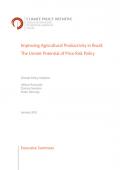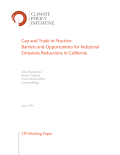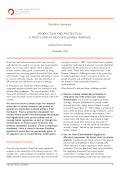The overriding challenge for many European governments today is to reduce major fiscal deficits with the least collateral damage to the economy. This report shows that carbon fiscal measures may raise significant revenues while having a less detrimental macro-economic impact than other tax options. This gives them an important potential role in fiscal policy; a role that is currently widely overlooked. This benefit arising from carbon fiscal measures goes beyond the usual arguments in their favour – namely that they are crucial, cost effective instruments to reduce Europe’s greenhouse gas emissions. The main focus of this report has been on the immediate opportunities for carbon pricing to assist with deficit reduction. In addition to this, the report explores whether there may also be longer term opportunities to raise greater revenue from carbon pricing while improving the efficiency and effectiveness of the EU ETS.
The Government of India has ambitious renewable energy targets, but limited financial resources to meet those targets. CPI examines how much it would cost the government to reach its renewable energy targets, by comparing the levelized cost of electricity from renewable energy to a baseline fossil fuel in absence of any subsidies – whether explicit or implicit; estimating the total cost of support for renewable energy under accelerated depreciation to determine which is the most cost-effective of existing policies; and investigating federal policy options to make this support even more cost-effective. The paper is organized in five sections. After the first section of introduction, section 2 discusses the selection of imported coal as the baseline cost of electricity for comparison with renewable energy. Section 3 forecasts and compares the levelized cost of electricity from renewable energy and the baseline of imported coal. Section 4 examines the cost of government support for renewable energy under different policy pathways. Section 5 presents policy implications.

The most comprehensive inventory of climate finance to-date, The Global Landscape of Climate Finance 2014, finds that global climate finance flows have fallen to USD 331 billion – far below even the most conservative estimates of investment needs. It also provides a detailed overview of the methodological challenges involved in tracking global climate finance flows. In addition to that, this report supports serious debate on these key questions by drawing together climate finance data from numerous sources to present policy makers with the most comprehensive information available about the scale, key actors, instruments, recipients, and uses of finance supporting climate change mitigation and adaptation outcomes.
Indonesia’s desire to drive economic growth and reduce climate risk is reflected in the sweeping policy reforms it has introduced in recent years to meet targets announced in 2009 to reduce greenhouse gas emissions. In this report, CPI identifies which public actors are investing in Indonesia, through which instruments, and what they are investing in to provide a baseline against which to measure progress and plan scale up. The landscape reveals investment patterns that allow decision makers to pinpoint where the biggest barriers and opportunities are.

California is both one of the largest economies and one of the largest emitters globally, making its climate change policies some of the most important in the world. They are also some of the most ambitious. In particular, California’s Global Warming Solutions Act of 2006 (AB32) set a series of policies and programs across all major business sectors to return California emissions to 1990 levels by 2020. A key component of this set of policies is the Cap and Trade Program, which caps greenhouse gas (GHG) emissions from key business sectors in California. With the Cap and Trade Program in its second year of full operation, CPI studies how firms make business decisions in the presence of a carbon price — whether abatement options that have been identified as technically feasible prove to be attractive in practice, or whether barriers prevent firms from pursuing otherwise cost-effective abatement options.
Concentrated solar power (CSP) is a promising technology for low-carbon power generation. Thanks to abundant solar resources in the world’s sun belt and its ability to provide flexible and reliable power supply when combined with thermal storage, CSP could play an important role in maintaining a steady power supply in future low-carbon energy systems with high penetrations of fluctuating renewable power from solar photovoltaic and wind. With findings drawn from four case studies and background paper, this policy brief offers recommendations for international finance institutions (IFIs) and developing country policymakers on how to deploy concentrated solar power (CSP) while achieving cost reductions.
Electricity systems across the U.S. and Europe face significant challenges in the transition to low-carbon energy. While the transition provides plenty of opportunities for investors, businesses, and consumers alike, the current business and regulatory models of investor owned utilities (IOUs) and independent power producers (IPPs), which have mainly developed around competitive markets for fossil fuel generation, are particularly ill-suited to take advantage of these new opportunities. This paper outlines the some major challenges each business segment will face and sets out a roadmap for addressing the challenges.
Renewable energy financing in emerging economies faces particularly daunting challenges, but there are creative policy solutions that could potentially reduce the cost of renewable energy support by as much as 30%.
In this policy brief, authors look at two potential solutions:
- Reduce the cost of using debt sourced from the developed world: Index renewable energy tariffs to foreign currency, in so doing eliminate the currency hedging costs that are responsible for the largest share of the difference between developed world and rapidly emerging country debt costs.
- Improve the cost-effectiveness of domestic renewable energy support programs: Provide lower-cost debt through debt concession programs, which our research shows could lower the total cost of providing required support.
Many developing countries are looking to grow their renewable energy portfolios to meet environmental, economic, business, and energy security goals, particularly as the costs for these technologies are declining rapidly.

The study finds that there is ample scope for enhanced protection of natural resources and growth of agricultural production in Brazil within a Production and Protection framework. From a protection standpoint, the country would benefit from developing mechanisms that significantly drive up the private cost of clearing native vegetation, as well as through the advancement of market-based incentives that promote sustainable practices. From a production standpoint, there is room to increase Brazilian agricultural production via productivity gains, at no apparent cost to environmental conservation.
